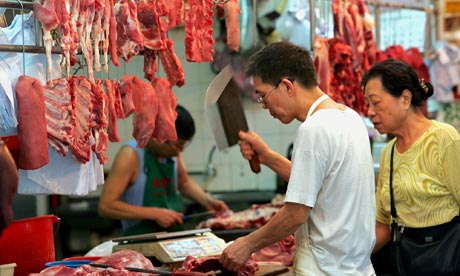China arrests 900 in fake meat scandal
Chinese authorities seize 20,000 tonnes of illegal meat products and detains gang passing off fox, mink and rat as mutton
Jonathan Kaiman in Beijing

China's other food
safety scares include reports of glow-in-the-dark pork, exploding
watermelons and fake eggs. Photograph: Vincent Yu/AP
Police in China have arrested 904 people for "meat-related
offences" over the past three months, including a gang that made more
than £1m by passing off fox, mink and rat meat as mutton, the country's public security ministry has announced.
Since January, authorities have seized 20,000 tonnes of illegal products and solved 382 cases of meat-related crime – primarily the sale of toxic, diseased and counterfeit meat.
One suspect, named Wei, earned more than £1m over the past four years by purchasing fox, mink and rat meat, treating it with gelatin, carmine (a colour produced from ground beetles) and nitrate, then selling it as mutton at farmers' markets in Jiangsu province and Shanghai. Authorities raided Wei's organisation in February, arresting 63 suspects and seizing 10 tonnes of meat and additives.
Suspects in the Baotou city produced fake beef and lamb jerky from duck meat and sold it to markets in 15 provinces. Levels of E coli in the counterfeit product "seriously exceeded standards", the ministry said.
 A baby treated for kidney stones after drinking tainted milk powder, in Chengdu, China. Photograph: China Photos/Getty
Hao, another suspect, from Fengxiang city, Shaanxi province, last
year sold mutton that had turned black and reeked of agricultural
chemicals to a barbecue restaurant, killing one customer and poisoning a
handful of others.
A baby treated for kidney stones after drinking tainted milk powder, in Chengdu, China. Photograph: China Photos/Getty
Hao, another suspect, from Fengxiang city, Shaanxi province, last
year sold mutton that had turned black and reeked of agricultural
chemicals to a barbecue restaurant, killing one customer and poisoning a
handful of others.
In Fujian province, five suspects were arrested and two factories shut for butchering disease-ridden pig carcasses and selling their meat in nearby provinces. The suspects had been hired by the agriculture ministry to collect the carcasses from farmers and dispose of them properly.
Authorities closed two factories in the south-western province of Guizhou for soaking chicken feet in hydrogen peroxide before shipping them to markets. And in Zhenjiang city, Jiangsu province, two people were arrested for selling pork products that were made with meat from "poor quality pig heads".
China's meat markets are already reeling from a spring riddled with food safety scares. Pork sales plummeted in March after about 16,000 pig carcasses were dredged from a river in Shanghai, an incident authorities have yet to fully explain. A virulent strain of avian flu has killed 26 people and put more than 129 in hospital since mid-April, wreaking havoc on the domestic poultry industry.
New guidelines calling for harsher penalties for those found guilty of producing or selling unsafe food products were announced by the country's top court on Friday.
The supreme people's court said the guidelines would list as crimes acts such as the sale of food excessively treated with chemicals or made from animals that have died from disease or unknown causes.
 A gang made more than £1m by passing off mink and rat meat as mutton. Photograph: PA
China's food safety
authorities are turning their attention to dairy products, according to
the Xinhua state news agency. In 2008, more than 54,000 infants became
ill and six were killed after being fed milk and baby formula that was tainted with the industrial chemical melamine.
A gang made more than £1m by passing off mink and rat meat as mutton. Photograph: PA
China's food safety
authorities are turning their attention to dairy products, according to
the Xinhua state news agency. In 2008, more than 54,000 infants became
ill and six were killed after being fed milk and baby formula that was tainted with the industrial chemical melamine.
Other food safety scandals in recent years include reports of glow-in-the-dark pork, exploding watermelons, cadmium-laced rice, fake eggs, salmonella-tainted seafood, carcinogenic recycled cooking oil and pesticide-soaked fruit.
Since January, authorities have seized 20,000 tonnes of illegal products and solved 382 cases of meat-related crime – primarily the sale of toxic, diseased and counterfeit meat.
One suspect, named Wei, earned more than £1m over the past four years by purchasing fox, mink and rat meat, treating it with gelatin, carmine (a colour produced from ground beetles) and nitrate, then selling it as mutton at farmers' markets in Jiangsu province and Shanghai. Authorities raided Wei's organisation in February, arresting 63 suspects and seizing 10 tonnes of meat and additives.
Suspects in the Baotou city produced fake beef and lamb jerky from duck meat and sold it to markets in 15 provinces. Levels of E coli in the counterfeit product "seriously exceeded standards", the ministry said.
 A baby treated for kidney stones after drinking tainted milk powder, in Chengdu, China. Photograph: China Photos/Getty
Hao, another suspect, from Fengxiang city, Shaanxi province, last
year sold mutton that had turned black and reeked of agricultural
chemicals to a barbecue restaurant, killing one customer and poisoning a
handful of others.
A baby treated for kidney stones after drinking tainted milk powder, in Chengdu, China. Photograph: China Photos/Getty
Hao, another suspect, from Fengxiang city, Shaanxi province, last
year sold mutton that had turned black and reeked of agricultural
chemicals to a barbecue restaurant, killing one customer and poisoning a
handful of others.In Fujian province, five suspects were arrested and two factories shut for butchering disease-ridden pig carcasses and selling their meat in nearby provinces. The suspects had been hired by the agriculture ministry to collect the carcasses from farmers and dispose of them properly.
Authorities closed two factories in the south-western province of Guizhou for soaking chicken feet in hydrogen peroxide before shipping them to markets. And in Zhenjiang city, Jiangsu province, two people were arrested for selling pork products that were made with meat from "poor quality pig heads".
China's meat markets are already reeling from a spring riddled with food safety scares. Pork sales plummeted in March after about 16,000 pig carcasses were dredged from a river in Shanghai, an incident authorities have yet to fully explain. A virulent strain of avian flu has killed 26 people and put more than 129 in hospital since mid-April, wreaking havoc on the domestic poultry industry.
New guidelines calling for harsher penalties for those found guilty of producing or selling unsafe food products were announced by the country's top court on Friday.
The supreme people's court said the guidelines would list as crimes acts such as the sale of food excessively treated with chemicals or made from animals that have died from disease or unknown causes.
 A gang made more than £1m by passing off mink and rat meat as mutton. Photograph: PA
China's food safety
authorities are turning their attention to dairy products, according to
the Xinhua state news agency. In 2008, more than 54,000 infants became
ill and six were killed after being fed milk and baby formula that was tainted with the industrial chemical melamine.
A gang made more than £1m by passing off mink and rat meat as mutton. Photograph: PA
China's food safety
authorities are turning their attention to dairy products, according to
the Xinhua state news agency. In 2008, more than 54,000 infants became
ill and six were killed after being fed milk and baby formula that was tainted with the industrial chemical melamine.Other food safety scandals in recent years include reports of glow-in-the-dark pork, exploding watermelons, cadmium-laced rice, fake eggs, salmonella-tainted seafood, carcinogenic recycled cooking oil and pesticide-soaked fruit.
No comments:
Post a Comment
Comments always welcome!